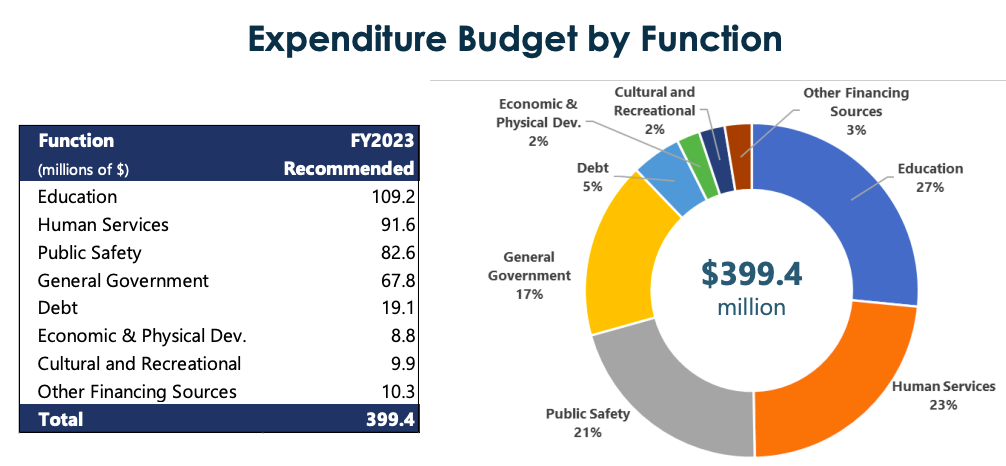A parade of Buncombe County Schools employees dominated proceedings at the June 7 meeting of the Buncombe County Board of Commissioners. During the board’s public hearing on the proposed fiscal year 2022-23 budget, a dozen BCS workers made repeated pleas for commissioners to increase wages, especially among support staff members who do not have teaching certifications.
The over $399 million general fund budget recommended by County Manager Avril Pinder directs $81.9 million to BCS, an 11.9% increase over the fiscal 2021-22 budget. That funding would increase all BCS salaries by 2.5% or to at least $15 per hour, whichever is higher.
However, the budget does not fund nearly $8.1 million in cost-of-living pay increases requested by BCS Superintendent Tony Baldwin in response to a salary study conducted by Hickory-based HIL Consultants. The county instead proposed that those increases “be phased in over [the] next two fiscal years (FY24 and FY25) in cooperation with Buncombe County Schools.”
As of June 13, the BCS website showed 103 open positions in departments such as maintenance, custodial, transportation and nutrition. Hourly wages for the jobs posted are as low as $12.01. Just Economics of WNC, a local economic advocacy and education nonprofit, has set $17.70 as the minimum hourly rate to meet the cost of living in Buncombe County.
The BCS employees who addressed the board cited years of low and stagnant wages, increased responsibilities and understaffed departments. “We still have to work other jobs to make ends meet,” said Melanie Allen, a 26-year veteran of BCS’ technology department. “We’re struggling. We feel like nobody cares. Morale is low. We have watched other counties and agencies enable steps and raises. We keep thinking we’re next, that we’ll be able to make it. Then nothing happens.”
Chris Kingsley, a bus driver and instructional assistant at Hominy Valley Elementary, continued that theme. “What we’re asking for is to be able to live off a full-time job without getting extra work. This would not be such a big ask if it hadn’t been left this long. The check engine light has been on for a long time — now the engine is dead,” he said.
Kingsley compared the district’s wages for school bus drivers, which begin at $13.68 an hour, to training wages for city of Asheville transit bus drivers, set at $18.78 an hour. “It is the responsibility of employers to make jobs attractive,” he said. “And BCS jobs are not attractive at all.”
And Jimmy Brown, an eight-year veteran of BCS’ technology services department, asked the commissioners to think about living solely on the salary each receives as an elected official. (Commissioners each make $28,916 annually, Vice Chair Amanda Edwards earns $32,548, and board Chair Brownie Newman earns $37,650.) “This also represents the pay scale of the vast majority of our noncertified, full-time employees,” he said. “We’re having a hard time taking care of our families, and it’s only getting harder for us as time goes on.”
None of the commissioners responded to the BCS employees after the hearing or indicated that they would consider revising the budget in accordance with their requests. The board is scheduled to vote on adopting the budget at its meeting of Tuesday, June 21.
In other news
County voters will see two bond proposals on their November ballots this year after commissioners unanimously voted to approve resolutions setting special bond referendums. If approved by the public, a $30 million open space bond would generate funds to purchase and improve land “for conservation and protection of natural resources and preservation of farmland, including but not limited to, the development of greenways and trails for recreation purposes.” Another $40 million bond issue would support “investments in housing for the benefit of persons of low or moderate income.”
A presentation by Assistant County Manager Sybil Tate outlined the county’s proposed oversight and transparency mechanisms for spending from the bonds, including advisory boards, independent audits and transparency websites. She noted that the county would hire two new staffers to manage bond projects through the spending deadline of 2032.
The board also unanimously approved a letter of support for a new health care facility in Buncombe County to address a need for 67 acute care beds identified by the N.C. Department of Health and Human Services Division of Health Service Regulation in its 2022 State Medical Facilities Plan. “The letter does not endorse any one organization but does endorse that we would like to see alternatives, and possibly the presence of a nonprofit,” noted Newman. Mission Hospital, operated by for-profit HCA Healthcare, has been Buncombe’s only hospital provider since 1995.




Going to have to start consolidating schools to reduce overhead of physical assets, as students and parents continue to leave buncombe county schools. Parents including teachers continue to move their kids to private, Christian and home school to avoid rainbow schools, not Noah’s rainbow the other rainbow.
Education not indoctrination or Buncombe county school will continue to an inoperable condition and be forced into consolidation one way or the other.
Asheville city schools are basically to this position and declining but continue to hold their hand out as if money is the problem.
Several years ago as the massive withdrawal was already underway Buncombe County schools said to employees remember who your customers are! Advice to keep a job, but the Buncombe County school leadership doesn’t seem to know who their customers are.
The customers are not
Sociologist
Social planners
Social engineer’s
Social activist
Underminers of Christian families
Proponents of male today-female tomorrow-some dozens of configurations of both
Let’s face it most parents want real education of kids at school, and keep the morality instruction at home. By the way not just in K-3 but K-12 and beyond.
Imagine how much effort it takes to expend $13k per child in the system and still come up short.